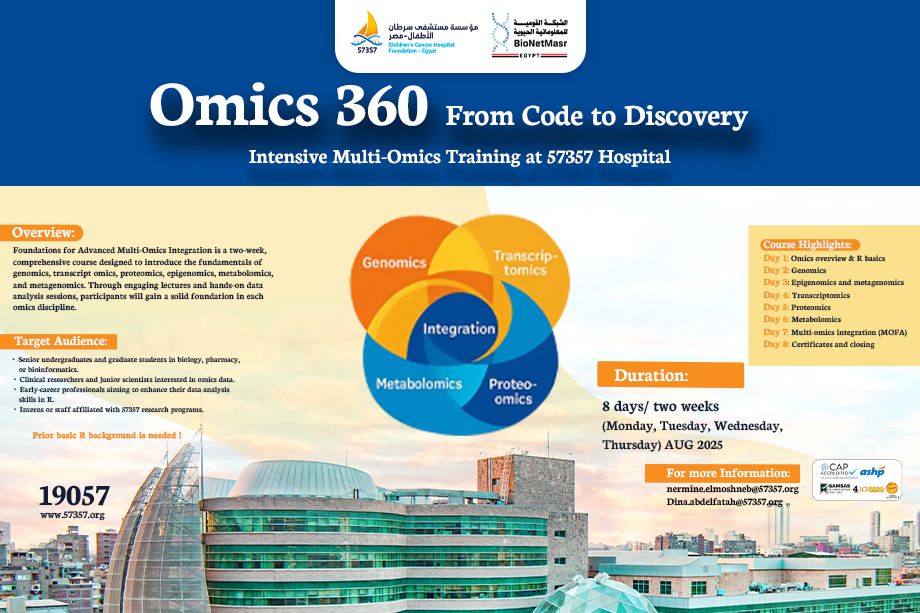Omics 360: from code to discovery

Overview
Foundations for Advanced Multi-omics Integration is a two-week, comprehensive course designed to introduce the fundamentals of genomics, transcript omics, proteomics, epigenomics, metabolomics, and metagenomics. Through engaging lectures and hands-on data analysis sessions, participants will gain a solid foundation in each omics discipline. This course is tailored for aspiring researchers and professionals, setting the stage for our advanced 3-day workshop on multi-omics integration techniques, where sophisticated methods like MOFA will be explored in depth.
Learning Objectives
- Comprehend the foundational principles of systems biology and the unique contributions of each omics layer—including genomics, transcriptomics, proteomics, metabolomics, epigenomics, and metagenomics—in understanding biological systems.
- Interpret and analyze high-throughput biological datasets using R programming, with hands-on experience in tools such as DESeq2, biomaRt, ggplot2, phyloseq, and MOFA2.
- Design and evaluate omics experiments by understanding best practices in study design, data preprocessing, normalization, quality control, and statistical analysis.
- Perform domain-specific analyses such as:
• Variant annotation and filtering for genomics
• Differential gene expression for transcriptomics
• Protein quantification and enrichment for proteomics
• Pathway mapping and clustering in metabolomics - Integrate and interpret multi-omics datasets using unsupervised latent factor models (MOFA2), gaining insights into complex biological patterns across different molecular layers.
- Utilize public databases and bioinformatics resources (e.g., Ensemble, NCBI, UniProt, HMDB, KEGG, SILVA) for data annotation, validation, and biological interpretation.
- Visualize and communicate biological findings through advanced plotting and dimensionality reduction techniques including PCA, heat maps, volcano plots, and diversity analysis.
- Critically assess challenges in omics data analysis, including missing data, batch effects, sample complexity, and the importance of reproducibility in bioinformatics workflows.
Program time line
| Day | Topic |
| Day 1 | Course Introduction + R Basics |
| Day 2 | Genomics + Variant Analysis in R |
| Day 3 | Transcriptomics + DESeq2 Workflow |
| Day 4 | Proteomics + Functional Interpretation |
| Day 5 | Epigenomics + Metagenomics (DADA2) |
| Day 6 | Metabolomics & Lipid omics |
| Day 7 | Multi-Omics Integration (MOFA2) |
| Day 8 | Closing ceremony |
Available dates
| No | Waves | Available dates |
| 1. | Wave One | From 18/8/2025-28/8/2025 |
Duration
Two Weeks (8 days)
Frequency
(Monday, Tuesday, Wednesday, Thursday)
Target Audience
- Senior undergraduates and graduate students in biology, pharmacy, or bioinformatics.
- Clinical researchers and junior scientists interested in omics data.
- Early-career professionals aiming to enhance their data analysis skills in R.
- Interns or staff affiliated with 57357 research programs.
Certificate Requirement’s
In order to receive your certificate, you have to attend not less than 80%
- Hard copy for 300 Egyptian Pounds
- Soft copy for free